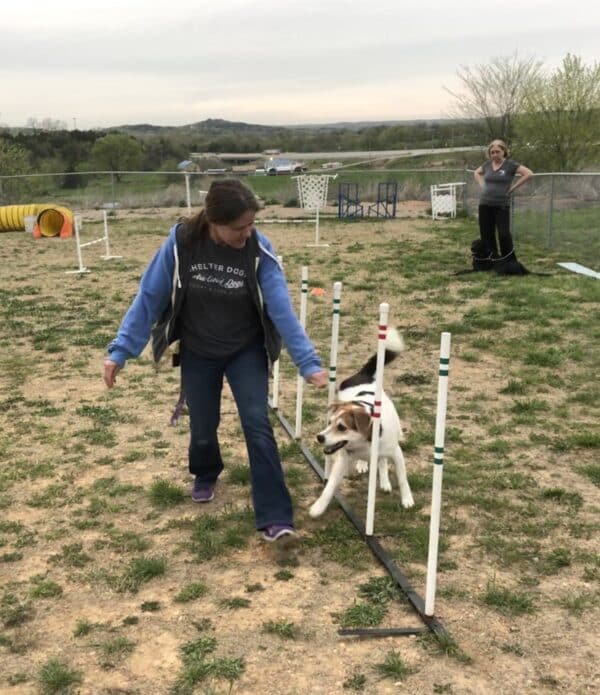Dogs communicate using a variety of vocal signals including howling, whining, growling, yelping and barking. While most of this language is easy for humans to understand, constant barking can make even the most informed of caregivers tear their hair out in frustration.
Dogs who bark excessively cause their families such distress that some resort to using equipment like anti-bark collars just to get some peace. While these devices might promise a quick-fix cure, they are highly aversive and generally cause dogs more distress, putting a Band-Aid on the problem without addressing the root cause. The good news is that barking can be modified without the use of aversive methods or equipment once the cause of the behavior is understood.
One bark doesn’t fit all
Research has shown that not only are all barks not the same, humans are reasonably wellattuned to what different barks mean. This seemingly innate understanding must be due to the bond people have shared with dogs for thousands of years. After all, some dogs were selectively bred to have loud voices once their usefulness as man’s first alarm system was recognized. This skill was harnessed and used to protect property and livestock as well as alerting hunters to a potential prey source.
If you live with a barker and are at the end of your tether with the constant noise, start investigating why your dog is barking, because you do not have to live like this. Dogs bark for many reasons, such as to get human attention, as a warning, in response to other barking dogs, when they are anxious or when excited, and it is important to identify what triggers the barking before teaching begins.
The 5 Types of Barking
1. Barking for attention
If your dog barks to get attention, try not to reward her demands with your attention. Don’t be tempted to tell your dog off, because you might inadvertently be rewarding her for barking even if your response is a negative one.
In this case:
- Ignore the barking.
- Wait for five seconds of quiet and then reward your dog with attention for being quiet.
This way your dog learns that she gets nothing from you when she barks, but everything when she is quiet.
Ignoring behavior can negatively impact dogs, too, however. Make sure your dog is not demanding attention because she needs to tell you something really important, which you are then ignoring.
2. Excited barking
A dog who barks when she gets excited, like before being fed or going for a walk, is harder to work with because a person’s pre-feeding or pre-departure cues are usually highly ritualized. For example, if the barking happens as soon as you go for your dog’s leash to take her for a walk:
- Drop the leash and go sit down.
- Keep repeating this until your dog is quiet.
- If you successfully attach the leash but she barks as soon as she gets outside, immediately come back inside.
This technique requires patience, but if you’re diligent, your dog will quickly learn that being quiet equals a walk.
If your dog barks excitedly in the backyard:
- Take her back into the house and only allow her out again when she is quiet.
- Keep repeating, if necessary, and never leave her in the backyard unattended.
3. Reactive barking
If she reacts and barks at other dogs or people inside or outside the home, it might be due to inadequate socialization, and she feels uncomfortable. In this case:
- Your dog needs a program where she can learn to cope in a social situation. Start these programs with a certified positive and humane trainer well ahead of any family gatherings or holiday celebrations you might be planning.
- It might be easier for your dog to spend time in a safe space behind a baby gate with some enrichment toys to play with than interact with people she does not feel comfortable with.
4. Separation barking
Dogs who suffer from anxiety when left alone will often bark excessively in the first 30 minutes after departure, while some will continue to bark until their person comes home. If your dog barks on separation you must get a trainer in to help, as separation anxiety can be a very difficult behavior to modify.
5. Alert barking
If your dog is barking, sometimes you might not see or hear the cause. Dogs tend to be sound sensitive and respond to noises they hear in the distance, including sounds that the human ear cannot hear. You might wonder why your dog suddenly wakes up from a deep sleep and starts barking seemingly at nothing, but she’s definitely heard something, even if you haven’t.
Barking alternatives
This brings me to my last point. As long as your dog has a clean bill of health from the veterinarian, one of the best remedies for dogs who bark excessively is to give them more outlets and opportunities for enrichment throughout the day, like walking or doing a discharging activity like chewing on a toy. Giving your barking dog these outlets goes a long way to having a peaceful, bark-free home.
Don’t Bark Back
When dogs BARK we tend to SHOUT back at them, but if we do the exact opposite and stay still and calm, it can have a profound affect. Dogs learn so much by watching people, and social learning can be very powerful.
This means that dogs learn by what people do, and in order to use the power of social learning to its fullest effect, it takes an awareness of one’s own body language. Yes, it can be frustrating not to “bark” back at a barking dog, but it really is up to you to find ways to modify the barking after you have identified the cause.





